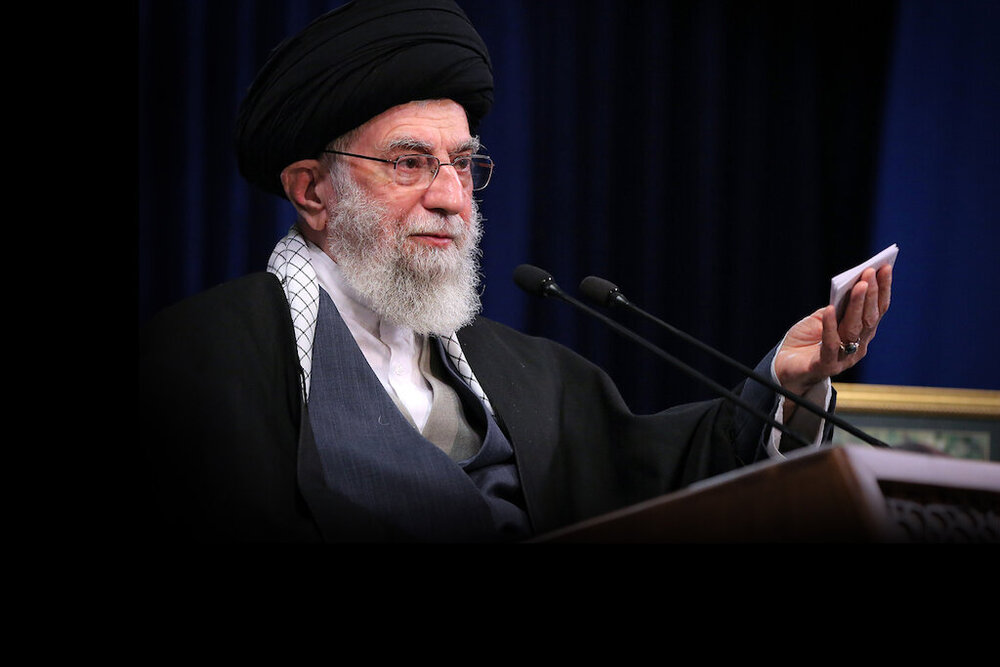On JCPOA, U.S. actions should speak louder than words, Leader says

TEHRAN – In his latest remarks on the current state of play between Iran and the United States, Leader of the Islamic Revolution Ayatollah Seyed Ali Khamenei underlined the need for Washington to take tangible measures before Tehran makes any move on the 2015 nuclear deal.
Addressing the people of East Azerbaijan province on Wednesday morning, the Leader pointed out that the Islamic Republic has heard many words and promises from the other side about the nuclear deal, formally known as the Joint Comprehensive Plan of Action (JCPOA), but this time only actions matter, and if the Islamic Republic sees actions from Europe and the U.S., it will act too.
“About the JCPOA, promises were made by the other side. I am saying one thing: We’ve heard many promises which were broken and contradicted in practice. Mere words don't help. This time only action! Action! If the Islamic Republic sees action from the other side, it will act too,” Ayatollah Khamenei said, adding, “We set the condition and the condition will not be retreated from.”
The remarks come amid heightened tensions over the nuclear deal due to the Biden administration’s stubborn insistence on continuing the failed policies of the Trump administration.
Biden officials have said that the U.S. will not rejoin the JCPOA before Iran returns to strict compliance with the deal and if Iran does so, they will return to the nuclear deal only to use it as a starting point for follow-on negotiations with Iran in a bid to replace it with a longer, expansive deal.
Iran has made it clear that it will not reverse the nuclear steps it has taken in response to the U.S. withdrawal from the JCPOA. In addition, Iran has said it will not renegotiate the nuclear deal.
After years of calling on the JCPOA parties to implement their obligations, Iran gradually began reducing JCPOA commitments on the first anniversary of the U.S. withdrawal from the deal. In its latest move, Iran raised the uranium enrichment level to 20%. It also intends to stop implementing the Additional Protocol to the nuclear Non-Proliferation Treaty (NPT) on February 23.
Instead of ensuring Iran’s legitimate interests in the JCPOA, the Europeans joined the Biden administration in calling for new nuclear and non-nuclear negotiations with Iran, a move that dampened hopes of a quick revival of the JCPOA and prompted Iran to double down on its nuclear activities.
Iran will implement a nuclear law obligating the government to halt implementing the Additional Protocol on February 23, Kazem Gharibabadi, Iran's Ambassador and Permanent Representative to international organizations in Vienna, said on Monday.
“Act of Parliament will be executed on time (23 Feb) and the IAEA has been informed today to ensure the smooth transition to a new course in due time. After all, goodwill brings about goodwill!” Ambassador Gharibabadi said in a tweet on Monday.
All of Iran’s remedial measures are intended to restore balance to the JCPOA. Iranian officials have said time and again that these measures are reversible upon U.S. compliance with the JCPOA.
“The ball is in the U.S. court now. When it lifts illegal sanctions in practice, everything will return to the right path,” Iranian President Hassan Rouhani said in a telephone conversation with his Swiss Counterpart Guy Parmelin on Tuesday.
However, the Europeans and the Americans keep shirking from their obligations by not taking the initiative to salvage the nuclear deal. They expect Iran to continue to fully implement the JCPOA while it has long been hollowed out by the White House.
But this approach doesn’t work with Iran because it seems to be hell-bent on moving ahead with its plans to halt implementing the Additional Protocol. Rafael Grossi, director-general of the International Atomic Energy Agency, will pay a visit to Iran next week but this visit is unlikely to dissuade Iran from stopping the implementation of the Additional Protocol.
Iran is determined not to give in to Western pressure because if it succumbs to this pressure, the West will continue to dictate its demands.
“The Islamic Republic has faced superpowers' hostility since day one. What’s the reason for this hostility? It’s because the Islamic system refuted domineering order's norms - i.e. dominating and giving in to domination - that ruled the world and were the domineering order’s lifeblood,” the Leader said. “The domineering order has always looked for excuses against the Islamic Revolution. One day it’s human rights, once vilifying theocracy, once the nuclear issue and once regional issues. They're all excuses. The key concern is that Iran won't give in to their domination.”
Therefore, the Biden administration should abandon Trump-era pressures if it really wants to rekindle diplomacy with Iran. During his February 4 speech at the State Department, Biden boasted that “America is back. Diplomacy is back at the center of our foreign policy.” But rhetoric is no longer enough. He needs to translate his words into actions on the ground. At the end of the day, actions speak louder than words.
Leave a Comment